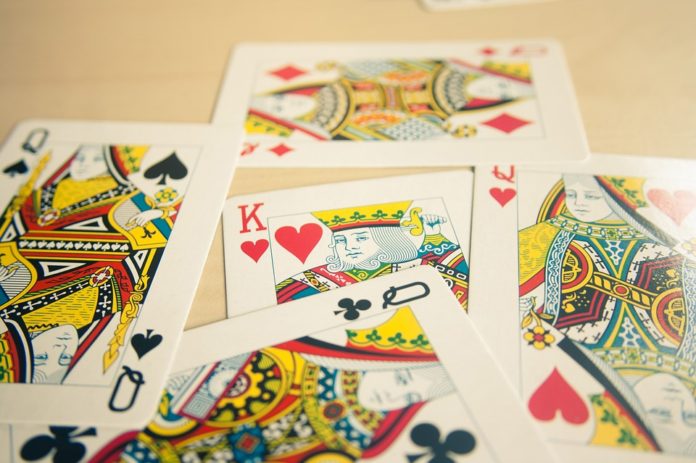The classic card game Pinochle originated in Europe and has been played for some time. It is a popular game and one that appeals to older crowds especially. Learn the rules and get actively involved whenever possible. The goal is to score points and empty the hand before other players do the same. The winning score will take the game and be awarded any prizes. Dealers will set the rules and score points as the game goes on between players. Multiple different players may sit at the table during a hand. Notably, a Pinochle deck will only feature 48 cards instead of the standard 52 card deck. That is because some face cards will only have two copies in a deck. That reduces the total number of cards to 48 at the start. The dealer should inspect the deck and make sure it conforms to the Pinochle rules. Some special Pinochle decks will be arranged inside of the packaging. Each player will be dealt 15 cards at the start of the game. The dealer will hand out one card and rotate until hands are filled. Turns are taken clockwise and will proceed according to certain steps.
Play Melds In Pinochle
Points will be awarded based primarily on the melds that players make each turn. That is similar to Rummy, but Pinochle has its own unique scoring system. Face cards and aces will net the most amount of points during a meld. But numerical cards can still score points for a player in a turn. That is especially true for ten cards, which earn the most for a numerical card. A meld describes a particular combination of cards that should keep people in the loop. Combinations such as the flush or aces meld may be familiar to veteran card players. But Pinochle will introduce special melds that earn different amounts of points. These may include the royal marriage or plain marriage featuring face cards. It is also possible to play a Pinochle during a meld. That describes a combination featuring queen and jack cards on the table. The dealer will judge melds and assign points based on the rules. Learn these rules to get familiar with how points are assigned. That could influence decisions made by the player during a game itself. Hold on to cards to secure the right combination, then play a meld on table.
Assign Points For Players
During a play, each meld will be rated according to its value. That is the typical means of securing points during a game. The coveted flush combination will give players 150 points. A Pinochle will get just 40 points, but is more common to see in a contest. Other plays include the Dix, which nets just 10 points. Over the course of the game, winning players may procure hundreds of points each contest. Bidding is another option that players have later in the game. That is a gamble, but could net more points for the player. It is possible to earn hundreds of points with a bid. The judge will decide whether a bid is a legal motion during a game. Conceding the game may cost a player points overall. There are other errors that could deduct points from the total. Stay competitive and find ways to earn points before the game ends. The contest is over when a player has emptied their hand and finished their meld. Preferably, they will also have the most points on board. The judge will review the point total and plays performed by people at the table. That could determine the winner on site for the game.
Tips For Winning
Stay on top of combinations that are allowed in Pinochle. It is fair game to question the tricks played by an opposing person. Ask about the melds set down by a player to have them judged. It is possible that errors have occurred and need to be revoked. That could give a new player an advantage over their peers. Look for ways to top a meld that has already been played. Hold on to cards until new face values are drawn from the deck. That could add to the total and give players an upper hand. After a bid is won, it is possible to pass cards between players. That is especially true when teams are assigned during a Pinochle match. Players can secure points and win outright using their teammate cards. Players have to score as many points as they want to bid. That will prevent them from losing a bid later in the match. Experience counts and will teach players when to utilize their points as needed. To score a bid in a match, play will have to stop immediately. Allow the judge time to assess a bid and award points when possible.
Variations On The Rules
Over time, new variations of Pinochle have been introduced. There are a lot of rules that determine etiquette during a particular match. Tradition has often decided which bidding practices are allowed. Experienced players may recall their own rules for how Pinochle games are decided. Talk to other players to get their opinion on which rules should be used. The judge and the table may also decide these rules for players. In a casino, the rules may be specified by the table itself. Ask about the availability of standard Pinochle before sitting down. Rules on bids may change dramatically depending on who is involved. There may be a minimum points level to initiate a bid. Some versions allow players to counter a bid with one of their own. New variations also make other combinations possible as well. That includes a double Pinochle meld that scores more points off hand. Some variations allow players to partner together for a round. These partnerships introduce special scoring options for duos at the table. Partnership Pinochle has attracted attention from friends who are new to the game. They can share information and secrets on the perfect meld.





